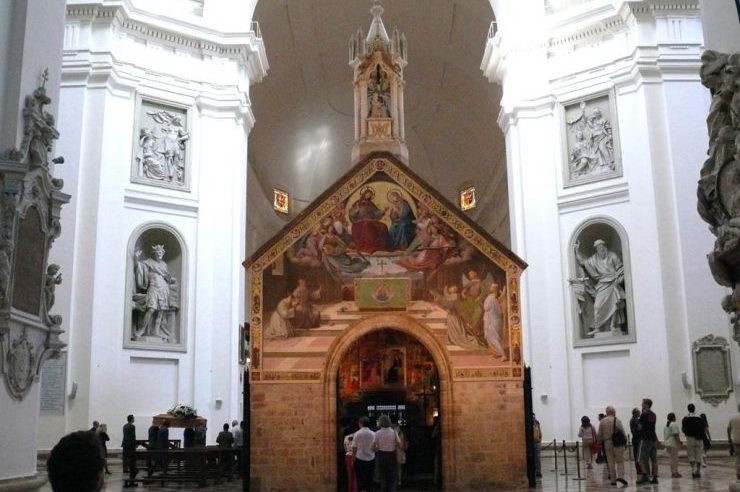Francis and the Portiuncula
by Joannie Watson | August 2, 2019 12:04 am
 [1]
[1]
Walking into the vast basilica of Santa Maria degli Angeli in Assisi, perhaps the last thing you might expect to see is another church. But you do expect it, because it is why you have come. Despite its size and grandeur, some pilgrims barely look around the larger basilica. They make a beeline for the small, humble chapel in the middle of it. It is St. Francis’ “Little Portion,” or Portiuncula.
The Portiuncula is one of the three churches rebuilt by St. Francis after his mystical experience inside San Damiano. Christ spoke to him from the crucifix and commanded him, “Rebuild my Church,” a request that Francis took literally.
The little chapel of St. Mary of the Angels had fallen into disrepair, but after Francis rebuilt it, it became the center of the Franciscan order. His followers gathered around him there. On Palm Sunday of 1211, St. Clare came to him at the Portiuncula, and he received her as the foundress and first member of what would become the Order of St. Clare, or the Poor Clares.
In addition to being the center of the Franciscan Order, since July of 1216, the Portiuncula has been given a unique privilege. A follower of St. Francis recounts that Pope Honorius III granted a plenary indulgence to anyone who visited the little church outside Assisi on its feast, August 2. Some say that Jesus Himself appeared to Francis, asking what he desired, and after hearing Francis’ request for the indulgence, sent him to the Holy Father.
Until then, a plenary indulgence could be received by visiting only one of three churches, all historic pilgrimage sites: the Holy Sepulchre in Jerusalem, St. Peter’s in Rome, and St. James’ tomb in Spain. To these great sites of Christianity was added Francis’ Little Portion.
Of all the things Francis could have asked the Holy Father for, he requested something for those who visited the church that he loved so much. What is more, he requested a gift that stretched into eternity. A plenary indulgence is the elimination of temporal punishment due to sin. While the confession of our sins in the Sacrament of Reconciliation eliminates the eternal punishment of sin (the sacrament saves us from the punishment of hell), temporal punishment remains. We still need to be purified from our attachment to sin. We can be purified in purgatory or on this earth through prayer, fasting, sacrifices, and penance. A plenary indulgence removes all of the temporal punishment (under the usual conditions – see here[2]) and can be received for ourselves or for a soul in purgatory.
Francis always saw himself as the little beggar who had received the Father’s mercy. Now his humble little church was an instrument of God’s great mercy. The indulgence has been extended over time to other Franciscan churches as well.
Upon visiting the Portiuncula in 2016 to mark the 800th anniversary of the “Pardon of Assisi,” Pope Francis reminded us, “Each of us might be that servant in the parable burdened with so great a debt that he could never repay it. When we kneel before the priest in the confessional, we do exactly what that servant did. We say, ‘Lord, have patience with me.’ We are well aware of our many faults and the fact that we often fall back into the same sins. Yet God never tires of offering us his forgiveness each time we ask for it. His is a pardon that is full and complete, one that assures us that, even if we fall back into the same sins, he is merciful and never ceases to love us.”
Please share this post on Facebook and other social media below:
- [Image]: http://www.integratedcatholiclife.org/wp-content/uploads/1A942615-4B5A-4426-86F2-FDB14C2D6D1A-e1564512694665.jpeg
- see here: https://www.catholic.org/prayers/indulgc.php
Source URL: https://integratedcatholiclife.org/2019/08/watson-francis-and-the-portiuncula/